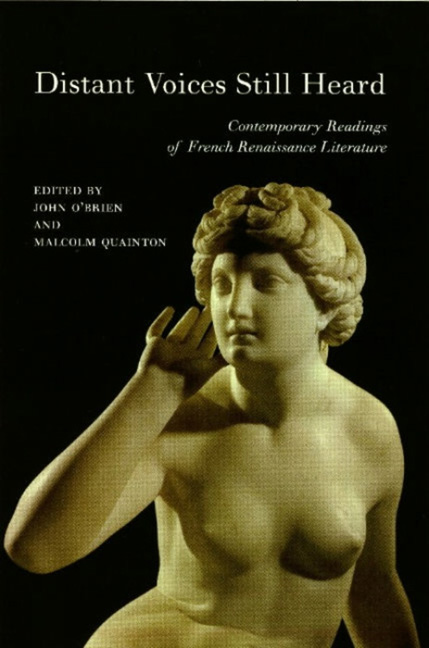Book contents
- Frontmatter
- Contents
- Editors’ Foreword
- Introduction: The Time of Theory
- 1 The Highs and Lows of Structuralist Reading: Rabelais, Pantagruel, chapters 10—13
- 2 Rabelais’ Strength and the Pitfalls of Methodology: Tiers Livre, chapters 7–18
- 3 ‘Blond chef, grande conqueste’: Feminist Theories of the Gaze, the blason anatomique and Louise Labé's Sonnet 6
- 4 Louise Labé's Feminist Poetics
- 5 Reading and Writing in the Tenth Story of the Heptaméron
- 6 Fetishism and Storytelling in Nouvelle 57 of Marguerite de Navarre's Heptaméron
- 7 Creative Choreography: Intertextual Dancing in Ronsard's Sonnets pour Hélène: II, 30
- 8 An Overshadowed Valediction: Ronsard's Dedicatory Epistle to Villeroy
- 9 ‘De l'amitié’ (Essais 1.28): ‘Luy’ and ‘Moy’
- 10 Montaigne's Death Sentences: Narrative and Subjectivity in ‘De la diversion’ (Essais 3.4)
- Select Bibliography
- Index
6 - Fetishism and Storytelling in Nouvelle 57 of Marguerite de Navarre's Heptaméron
- Frontmatter
- Contents
- Editors’ Foreword
- Introduction: The Time of Theory
- 1 The Highs and Lows of Structuralist Reading: Rabelais, Pantagruel, chapters 10—13
- 2 Rabelais’ Strength and the Pitfalls of Methodology: Tiers Livre, chapters 7–18
- 3 ‘Blond chef, grande conqueste’: Feminist Theories of the Gaze, the blason anatomique and Louise Labé's Sonnet 6
- 4 Louise Labé's Feminist Poetics
- 5 Reading and Writing in the Tenth Story of the Heptaméron
- 6 Fetishism and Storytelling in Nouvelle 57 of Marguerite de Navarre's Heptaméron
- 7 Creative Choreography: Intertextual Dancing in Ronsard's Sonnets pour Hélène: II, 30
- 8 An Overshadowed Valediction: Ronsard's Dedicatory Epistle to Villeroy
- 9 ‘De l'amitié’ (Essais 1.28): ‘Luy’ and ‘Moy’
- 10 Montaigne's Death Sentences: Narrative and Subjectivity in ‘De la diversion’ (Essais 3.4)
- Select Bibliography
- Index
Summary
According to Jacques Lacan, fetishism is a fundamental example of the dynamics of desire. It illustrates both the illusory nature of the object of desire – which, in the case of the fetishist, has been displaced from the original object of desire (the other) as a result of his frustration – and the way in which the subject attempts to (re)constitute himself through his relation with the fetishised object. As we shall see, the fifty-seventh Nouvelle of Marguerite de Navarre's Heptaméron is a particularly striking literary illustration of the dynamic described by Lacan.
Some may argue that a Lacanian approach to a work written during the Renaissance is shamefully anachronistic. Indeed, how can any modern reader pretend to escape that problem? We are all products of our times and bound to our subjectivity. The best strategy might be to abandon the chimeric ideal of objectivity and put our subjectivity to good use. Subjectivity is, paradoxically, universal. Similarly, certain aspects of the human condition are timeless. Such is the case with desire, which is at the heart of all human endeavours. It is a fundamental structuring principle of thought and expression. Language itself therefore bears the mark of unconscious desires. Indeed, for Lacan, the unconscious is structured like a language. The discourse of the Other, of the unconscious, invades all utterances, whether spoken or written, undermining the illusory mastery of conscious thought and expression. Meaning, which is never as straightforward as we might wish, is therefore revealed not only through the signified(s) to which the signifiers are presumed to point, but also via the play of signifiers in the text.
Of course, it must be stated right from the start that it is dangerous to use psychoanalytic theories literally in literary criticism. Most terms, such as the phallus, are metaphors, and the concepts attached to them function by analogy. As Lacan reminds us, Freud uses the mother's missing phallus to illustrate his theories of the fetish, but he warns us not to interpret the Austrian psychoanalyst's words literally; this does not designate a real phallus that does or does not exist.
- Type
- Chapter
- Information
- Distant Voices Still HeardContemporary Readings of French Renaissance Literature, pp. 138 - 154Publisher: Liverpool University PressPrint publication year: 2000



